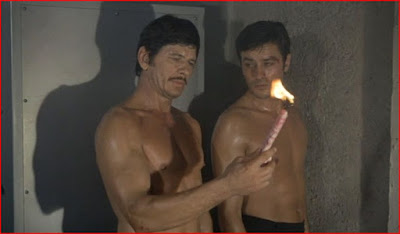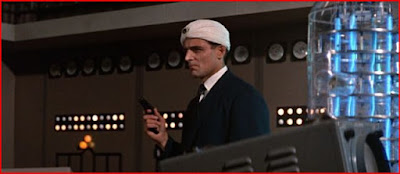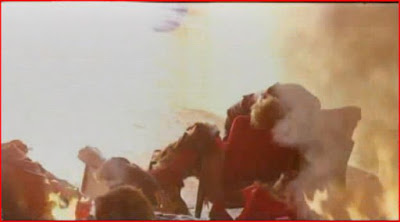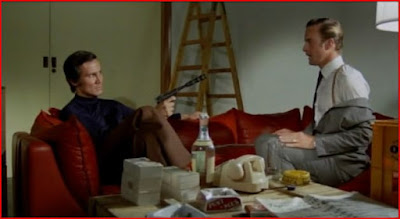 In the wake of the fall of South Vietnam, the United States government creates "Project E.S.A." to prevent the domino theory from being proven a reality. The Americans will invest $15,000,000 to finance counterinsurgency efforts and other initiatives to shore up the governments of the region. The money will be deposited in the Oriental Bank in Manila, where Johnny Duran is the liaison with the E.S.A. Duran's involvement in the scheme is known to elements of American organized crime, represented by a mystery man who corners Duran in an International House of Pancakes.
In the wake of the fall of South Vietnam, the United States government creates "Project E.S.A." to prevent the domino theory from being proven a reality. The Americans will invest $15,000,000 to finance counterinsurgency efforts and other initiatives to shore up the governments of the region. The money will be deposited in the Oriental Bank in Manila, where Johnny Duran is the liaison with the E.S.A. Duran's involvement in the scheme is known to elements of American organized crime, represented by a mystery man who corners Duran in an International House of Pancakes."My name is Lew Simpson," he explains, "Most of my friends call me...Wilbur." This is a fittingly strange introduction to one of the most inept performers I've ever seen. In his only performance known to the IMDB, B. T. Anderson has clear difficulty remembering his lines. Unfortunately, director Efrem C. Pinon has placed the idiot cards behind Anderson, so that he has to look over his shoulder every few moments to finish his sentences. "You've been used to money," his character tells Duran, "You've been surrounded by it eight hours........a day." Later, on board his office yacht, "Wilbur" tells Duran about Rocky, "my main man [who] has in his file, and in his head, more than five hundred names. He knows the size of their bank accounts, the time of day when they take a........take a crap." He may actually have meant that pause for emphasis, or that may be the way it was written in the script co-written by multitalented Asian-Arkansan Leo Fong. However you slice it, you know you're in the hands of masters the rest of the way.
"Wilbur" has persuaded Duran to act as the inside man in a daring "foolproof" scheme to take the $15,000,000 from the Oriental Bank. The foolproof part of the plan, he tells his new partner, is that the robbers are blind men. There's Willie Black (D'Urville Martin), who got his eyes gouged out by gangsters, as we see in a flashback. There's Len Wang (Fong), a Hong Kong enforcer who crossed the triads and got acid in his face, as we see in a flashback. There's Hector Lopez, a matador who had his eyes gored out by a bull. No flashback for that one. Finally, there's the naturally blind magician, Amazing Anderson. They make ideal bank robbers because A. they're used to working without sight, and B. No one expects blind guys to rob a bank. That's what makes it foolproof!Rocky tries to figure out Johnny Duran's bank account, crap habits or fashion sense in Blind Rage.
The gang that could shoot straight, but couldn't see what they were shooting: from left, D'Urville Martin, Leo Fong, Darnell Garcia and Dick Adair.
Intensive training also helps. Duran puts together a full-scale replica of the bank so the bandits can learn their way around it in carefully timed and measured movements. They receive martial arts training so they can manhandle anyone who manhandles them. They become crack shooters trained to fire instantly (and accurately) at any unfamiliar sound -- and they have metal taps installed in their shoes so they'll know their own footfalls. Duran has recruited Sally, an educator at a school for the handicapped, to whip the men into shape, but only late in the game does he realize that he needs a blind electronics expert to deactivate the bank alarms. Sally knows just the man: Ben Gavara, who "needs money so he can get even with the world" for getting blinded by fellow gangsters, as we see in another flashback. He feels protective toward Sally, especially when Willie Black attempts to become a blind rapist. "Lay off her, sex-hungry bastard!" Ben warns him.
Against all odds, the robbery works, though thanks less to Ben's electronics expertise than to his knocking a guard's head into an electrical circuit to deactivate the alarm. Our trigger-happy blind men bump off several bank employees, one for merely leaning to one side, for which Len Wang apologizes. Ben goes his own way while the foreigners are packed into a leaky gas truck for shipment out of the country, and is promptly caught in a dragnet of known blind criminals. Under pressure to rat out his partners, he does so instantly. But Sally and the rest of the gang seem destined for a fiery reckoning at the airport no matter what Ben does, while Johnny Duran boards another plane for California with the loot.
Enter Fred Williamson. More specifically, enter Jesse Crowder, a character Williamson created for the movie Death Journey in 1975 and reprised in 1976's No Way Back. Crowder was apparently very popular in the Philippines, or else Blind Rage's Philippine producers thought including Williamson as Crowder would give their film a better shot at U.S. distribution. Whatever the reason, it's an odd shift in tone for the film to become a Fred Williamson movie in its last reel. For some reason the U.S. government needs a super-operative like Crowder to figure out how to tail a man they already know about until he makes contact with Lew "Wilbur" Simpson at another IHoP to bring the picture full circle. But maybe they needed a badass like Crowder to take the dangerous Duran down. Recall that he was just some schlub who worked for the bank and wore loud clothes before "Wilbur" set him up as a criminal. But now, at the movie's climax on a rooftop outside the IHop, he gets all Emperor of the North on Crowder.
Crowder: All right, Duran. That's about as far as you go.
Duran: There is no way one man can take me alive.
Crowder: [points gun].
Duran: I said one man!
Crowder: [shrugs] Forgot to load it this morning anyway.
Crowder than tosses his gun aside to engage the rogue banker in hand-to-hand combat, and actually gets his trademark cigar knocked out of his mouth before setting things to rights. That may not be enough for Fred Williamson fans who get suckered into this film on the assumption that he's the star and fights the blind bandits. VideoAsia's Thug City Chronicles collection goes so far wrong as to claim that Fred leads the blind gang in this picture. Even more disappointed will be such fans as there are of eccentric auteur Leo Fong. Though the story is as goofy as you might expect from Fong, whatever his actual contribution was, he doesn't really have much to do in the picture and his distinctive voice is overdubbed by another actor. Those caveats aside, bad movie connoisseurs should have a blast with this blockheaded epic. If the story isn't enough for you, there are outrageous Seventies fashions and ponderous theme ballad, "The System," to take into consideration. I'll leave you with some lyrics from Tito Sotto's song:
We live in a world
Of heartaches and pain
And somehow you feel
Life's just but a game
So dare not say why.
You have to survive.
The moment you fall...
...Into the System!
And speaking of falsely advertising a Fred Williamson vehicle, here's the trailer as uploaded by HuffTheTalbot


























































